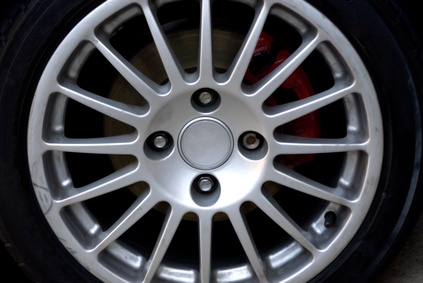
A wheel bearing is used within the center of each wheel hub to avoid metal-to-metal grinding. It is well lubricated to reduce as much noise as possible. Eventually it will wear down and need to be replaced. It may become dislodged due to rough terrain, rusted from water or damaged from dirt and rough particles. Symptoms will arise that can be seen or heard and the replacement of the wheel bearings will be important to avoid an accident.
Listen for grinding noises originating from a moving wheel. When the bearing becomes dislodged or irritated it will produce a grinding or rumbling noise. There are other problems that can make grinding noises, but a wheel bearing issue will be related to the speed and movement of the vehicle. The grinding will get louder and faster as the vehicle accelerates, and it will get louder or stop altogether when going around corners as the weight of the vehicle shifts. Driving around in a large open area to shift weight on each wheel separately is the best way to determine which bearing is degrading. The loudest noise will come from the defective wheel.
Lift the vehicle so the wheels are free from traction by using a jack or industrial lift. When the wheel bearings wear out they lose their shape and no longer fit solidly as they are supposed to, which in turn allows some play in how the wheel rotates. Shake the wheel in and out and if it is loose then the wheel bearings might be wearing out and should be replaced.
Examine the tires for extreme wear and tear. When the wheel bearings wear out they become loose and the wheel no longer is in solid rotation. If the tires are no longer following a solid path they will begin to wear very quickly and unevenly, and this is a sign that the wheel bearings need to be replaced soon.
Check any available nuts and bolts and ensure they are tight enough for travel. This might solve some problems with tire wear and sudden noises. If not, then the replacement of the wheel bearings might be necessary.